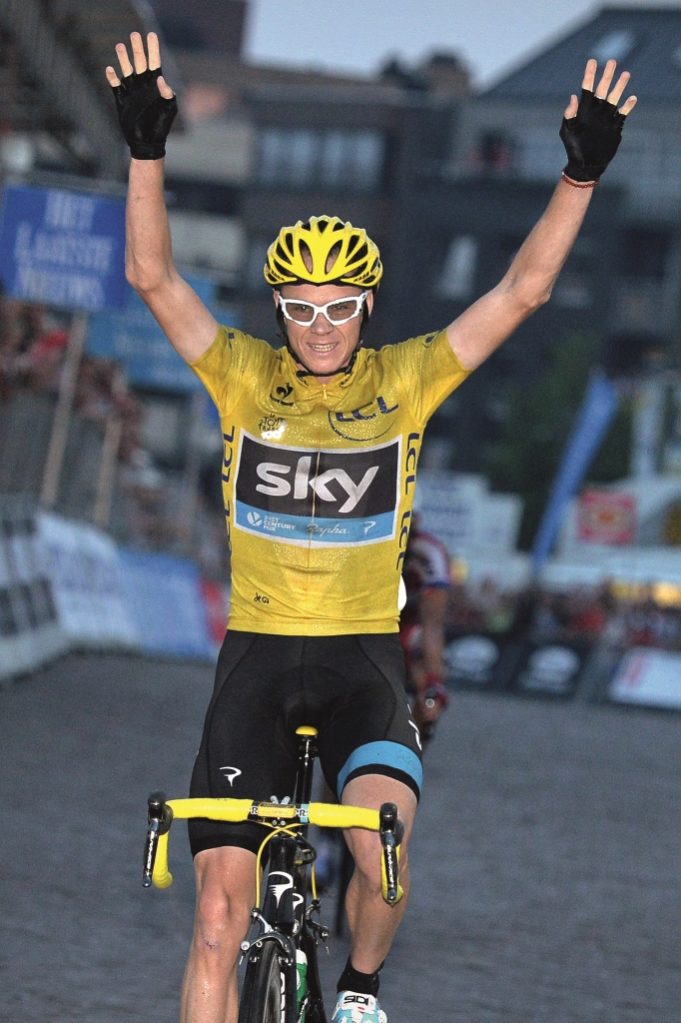Do you remember the second man to land on the moon? How about the sprinter who was second behind Usain Bolt at the London 2012 Olympics? That’s what I thought. So last year when Christopher Froome came second behind Bradley Wiggins at the Tour de France, the world took little notice. This year it all changed when he rode into the history books and became the first African-born cyclist to win the prestigious race in 110 years.
Place yourself on the back of Froome’s bike for a second. It’s the last stretch of one of the toughest cycling races in the world. You’re hemmed in by thousands of cheering fans who watch in awe as you zoom past. Any slight mistake can cost you the race. With one last push, you cross the finish line and are engulfed by the crowd. In the midst of the mobbish crowd you look up and see two familiar faces, fiancé Michelle Cound and former schoolmate Matthew Beckett.
“We were standing in the grandstand waiting for the finish just counting down to the three km mark. The entire last day is a procession and you’re never going to lose the tour on the last day… but until he passes the three km mark you can’t actually breathe that last sigh of relief… [When he crossed the finish line] I gave him a big hug and had a bit of a cry,” says Beckett with tears in his eyes.
Since the Lance Armstrong doping scandal, which saw him stripped of his seven Tour de France titles and banned from the sport for life, the controls on the sport have tightened. These days riders carry blood passports and are required to log onto an internet site and state where they are for an hour every day. This allows for random doping tests. If a cyclist misses three tests they are banned from racing for two years. In the 23 days of the tour, Froome was tested 27 times and passed.
It was a cycling career born on the hard roads of Nairobi, Kenya, where a young Froome peddled for fun. Little did he know then that it would lead him to Paris.
Froome left Nairobi at the age of 14 when his parents relocated to Johannesburg, South Africa. He completed high school at the elite St Johns College, where he accelerated his passion for cycling by joining the schools club. Alan Lion-Cachet, the school’s sports director, remembers Froome as a humble pupil who always had a smile on his face.
“He was spinning in the gym one day and some of his mates came into the gym, showered him with leaves and water, as if egging him on in the Tour de France, and chanted inspirational cries of ‘Go Chris go! You’re leading the TDF [Tour de France],” says Lion-Cachet.
Since 2008, thanks to his British passport, Froome has ridden under British license. In 2010, he joined Team Sky and has become one of their key riders. But things haven’t always been easy.
In 2006, twenty-year-old Froome rode for Kenya at the Road World Championships in Salzburg, Austria.
“He paid for himself to go. He was his own mechanic, own team manager, he was his own everything…” says Beckett.
Minutes into the race Froome crashed into an official, sending both men flying. He got back up, finished the race and learnt one of the greatest lessons in life: If first you don’t succeed, dust yourself off and get back on your bike.
In seven years, life has changed beyond recognition. Now he has a manager, support team and his latest win earned him €450,000 ($596,000) and a brand new Jaguar V6 F-Type, worth £67,000 ($103,000).
Froome dedicated his win to his late mother, Jane, who died from cancer in 2008.
In an interview in Britain’s Daily Mail Froome said he hopes his win will inspire.
“I hope it sends a message to a lot of young Africans to inspire them to achieve their dreams even though it may seem very far away. If they want something badly enough then they can find a way to make it happen, as I did,” says Froome.
No one can say what went through Froome’s mind as he crossed the finish line in Paris. Though, you can be sure that film makers have it in mind. Imagine, on a dusty Kenyan road, a young boy peddles his bike, with a small sticker that reads Made in Britain. There is a South African flag on his left handle and a Kenyan flag on his right handle. As he stares out into the warm sunset he says: “One day I’m going to win the Tour de France”. Indeed, I feel an advertisement is in the air.
